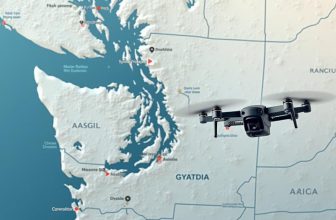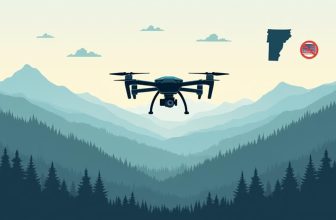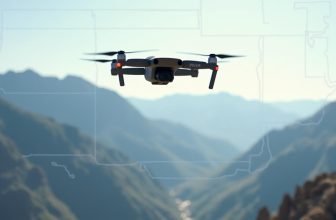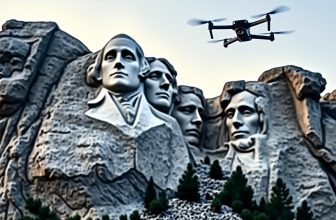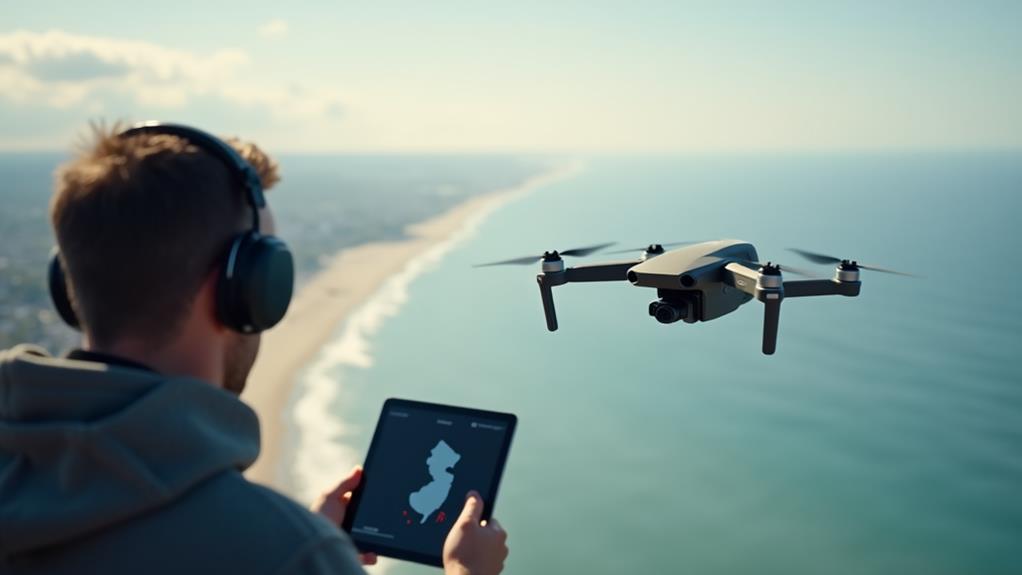
If you're a drone operator in New Jersey, it's vital you're aware of the laws and regulations that govern your activities. You'll need to register your device with the FAA if it weighs over 0.55 pounds, and if you're using your drone for commercial purposes, a remote pilot certificate is required. But that's just the beginning – you'll also need to navigate national airspace restrictions, no-fly zones, and respect the state's right to privacy laws. As you consider flying your drone in the Garden State, you'll want to know what else is at stake and how to avoid costly penalties.
Contents
- 1 Key Takeaways
- 2 Recreational Drone Usage Laws
- 3 Commercial Drone Operation Rules
- 4 Drone Registration Requirements
- 5 Airspace Restrictions in NJ
- 6 Right to Privacy Laws
- 7 Trespassing With Drones
- 8 Liability and Insurance
- 9 Local Ordinances and Regulations
- 10 Penalties for Non-Compliance
- 11 Frequently Asked Questions
- 12 Conclusion
Key Takeaways
- Register drones over 0.55 pounds with the FAA, pay a $5 fee, and mark with the assigned registration number.
- Comply with national airspace restrictions and identify no-fly zones, such as national parks and military bases.
- Respect individuals' right to privacy in New Jersey by avoiding surveillance and obtaining permission to fly over private property.
- Drone operators are liable for damages or injuries caused and can consider liability insurance for financial protection.
- Research and comply with local ordinances and regulations in areas of operation, such as municipal codes and County restrictions.
Recreational Drone Usage Laws
If you plan to fly a drone for recreational purposes in New Jersey, you must comply with the state's regulations and the Federal Aviation Administration's (FAA) rules.
You're required to register your drone if it weighs more than 0.55 pounds and less than 55 pounds. Additionally, you must mark your drone with your FAA registration number.
When flying your drone, you'll need to follow Drone Etiquette guidelines, which include respecting people's privacy and not flying over crowds.
You're also prohibited from flying your drone within 5 miles of an airport unless you've notified the airport authority and air traffic control.
In New Jersey state parks, you'll need to follow Park Rules, which may restrict drone usage to designated areas.
It's essential to check with local authorities for any specific regulations in the area you plan to fly.
You must also follow FAA guidelines, such as maintaining a visual line of sight with your drone and not flying higher than 400 feet above ground level.
Failure to comply with these regulations may result in fines and penalties.
Always check for updates to these regulations before flying your drone in New Jersey.
Commercial Drone Operation Rules
If you plan to use your drone for commercial purposes in New Jersey, you'll need to comply with specific rules and regulations.
You must register your drone with the Federal Aviation Administration (FAA) and obtain a remote pilot certificate with a small unmanned aircraft systems (sUAS) rating.
You'll also need to meet licensing and training requirements to guarantee you're qualified to operate your drone safely and effectively.
Registration Requirements
To operate a drone commercially in New Jersey, you must register your aircraft with the Federal Aviation Administration (FAA) if it weighs more than 0.55 pounds and less than 55 pounds, including payloads such as cameras.
This registration process applies to both recreational and commercial drone pilots, but commercial pilots must follow additional guidelines.
To register your drone, you'll need to follow these steps:
- Create an account: Visit the FAA's online registration portal to create an account.
- Pay the registration fee: Pay the required drone fee, which is currently $5 per drone.
- Register your drone: Complete the registration process by providing the required information, including your name, email address, and drone make and model.
- Mark your drone: Once you've completed the registration process, mark your drone with the assigned FAA registration number.
After completing the registration process, you'll receive a unique registration number that you must mark on your drone.
This number is valid for three years, after which you'll need to renew your registration.
Licensing and Training
To prepare for the test, you can take a training course from a certified Drone Instructor. These courses cover topics such as aircraft performance, weather, airspace, and regulations.
| Pilot Certification | Eligibility | Training |
|---|---|---|
| Remote Pilot Certificate | Be at least 16 years old | Complete a training course from a certified Drone Instructor |
| sUAS Rating | Pass a background check | Study for the FAA knowledge test |
| Recurrent Training | Complete a recurrent training course every 24 months | Review and update your knowledge of regulations and best practices |
Drone Registration Requirements
To register your drone, you'll need to follow these steps:
- Visit the FAA's website: Go to the FAA's online registration portal to start the registration process.
- Provide required information: Enter your name, email address, and physical address to create an account.
- Pay the registration fee: Pay a fee of $5 to register your drone, which is valid for three years.
- Mark your drone: Once registered, mark your drone with the assigned registration number to guarantee compliance with FAA regulations.
Airspace Restrictions in NJ
When flying a drone in New Jersey, you must comply with national airspace restrictions, which include rules governing altitude, air traffic control, and proximity to airports.
You'll also need to be aware of restricted air zones, defined by the Federal Aviation Administration (FAA) as areas with security concerns or environmental restrictions.
Additionally, you'll need to identify no-fly zones, such as national parks, military bases, and areas with temporary flight restrictions, to avoid fines and penalties.
National Airspace Restrictions
Flying a drone in New Jersey means traversing a complex web of airspace restrictions.
As a drone operator, you must be aware of the national airspace restrictions that apply to your flights. These restrictions are in place to safeguard national security and maintain safe air traffic.
You'll need to navigate the following national airspace restrictions:
- National Security Restrictions: Certain areas are restricted due to national security concerns, such as military bases and national defense facilities.
- Temporary Flight Restrictions (TFRs): TFRs are temporary restrictions on airspace due to events such as natural disasters, major sporting events, or national security concerns.
- Air Traffic Control (ATC) Restrictions: You'll need to comply with ATC instructions and avoid flying in restricted airspace, such as near airports or in areas with high air traffic.
- Federal Aviation Administration (FAA) Regulations: You must comply with FAA regulations, such as right-of-way rules and altitude restrictions, to guarantee safe air traffic.
Understanding these national airspace restrictions is vital to guarantee safe and compliant drone operations in New Jersey.
Restricted Air Zones Defined
In addition to traversing national airspace restrictions, you must also be aware of restricted air zones within New Jersey.
These restricted areas are designated by the Federal Aviation Administration (FAA) to protect national security, public safety, and the environment. You're required to know and respect these restricted air zones to guarantee safe and lawful drone operations.
Airport boundaries are among the restricted air zones in New Jersey. You're not allowed to fly your drone within a 5-mile radius of an airport, unless you've obtained prior authorization from the airport's air traffic control.
Military bases are also restricted air zones, and you're not permitted to fly your drone within these areas. Other restricted air zones may include national parks, wildlife refuges, and areas with temporary flight restrictions.
Before flying your drone in New Jersey, it's crucial to check the FAA's B4UFLY app or the agency's website to determine if you're within a restricted air zone.
You're responsible for knowing and following these restrictions to avoid penalties and guarantee public safety. Failure to comply may result in fines or other enforcement actions.
No Fly Zones
New Jersey's airspace restrictions, also known as No Fly Zones, are designated areas where drone operations are strictly prohibited or severely limited.
You must be aware of these areas to avoid any potential penalties or safety risks.
When flying a drone in New Jersey, you should steer clear of the following No Fly Zones:
- Airport boundaries: You must maintain a 5-mile radius from airport boundaries, unless you have obtained prior authorization from air traffic control.
- Military bases: Military bases, such as McGuire Air Force Base and Naval Air Station Wildwood, are strictly off-limits to drone operations.
- National parks and wildlife refuges: Many national parks and wildlife refuges in New Jersey have restricted airspace, and drone operations may be prohibited or require special permits.
- Prisons and correctional facilities: You're also prohibited from flying drones over prisons and correctional facilities in New Jersey.
Familiarize yourself with these No Fly Zones to guarantee compliance with New Jersey's drone regulations and to maintain safe airspace.
Right to Privacy Laws
When operating a drone in New Jersey, you must be aware of the state's Right to Privacy Laws, which safeguard individuals' reasonable expectations of privacy.
These laws address surveillance concerns and guarantee that your drone operations don't infringe on others' privacy expectations. You must respect individuals' right to privacy and refrain from capturing images or videos of people in private areas, such as backyards, homes, or areas enclosed by fences.
New Jersey's Right to Privacy Laws consider the following factors when determining whether a reasonable expectation of privacy has been violated: the drone's altitude, the type of surveillance equipment used, and the individual's location.
You must operate your drone in a way that doesn't intrude on others' private spaces and respect people's right to seclusion. If you capture images or videos that could be considered an invasion of privacy, you may be liable for damages or face other penalties.
Familiarize yourself with New Jersey's Right to Privacy Laws to guarantee that your drone operations comply with these regulations and respect individuals' right to privacy.
Trespassing With Drones
Operating a drone in New Jersey requires you to be aware of not only the state's Right to Privacy Laws but also the regulations surrounding trespassing.
Trespassing with drones involves flying over private property without the owner's consent, potentially invading their right to privacy and security.
In New Jersey, private property owners have the right to control who enters their property, including the airspace above it.
If you're considering flying your drone over private property, you should:
- Obtain permission: Get explicit permission from the property owner before flying over their land.
- Respect boundaries: Be aware of the property lines and avoid flying over neighboring properties without permission.
- Avoid aerial voyeurism: Refrain from flying over private property to gather information or images without consent, as this can be considered an invasion of privacy.
- Comply with local regulations: Familiarize yourself with local ordinances and regulations regarding drone use over private property.
Liability and Insurance
As a drone operator in New Jersey, you're exposed to a unique set of risks that can result in liability claims against you.
When operating a drone, you're responsible for any damage or injury caused by the device, including damage to people, property, or other aircraft. In the event of a drone accident, you may be held liable for any resulting damages or losses.
Drone accidents can occur due to various reasons, such as loss of control, equipment failure, or pilot error.
If you're found liable for a drone accident, you may face financial losses, including compensation for damages, medical expenses, and other related costs.
To mitigate these risks, it's vital to ponder obtaining liability insurance specifically designed for drone operators.
Liability insurance can provide financial protection in the event of a drone accident, covering costs associated with insurance claims, including defense costs, settlements, and judgments.
By investing in liability insurance, you can reduce your financial exposure and protect your assets in the event of a drone-related accident.
It's imperative to meticulously review your insurance policy to understand the terms, conditions, and coverage limits to guarantee you're adequately protected.
Local Ordinances and Regulations
Several local ordinances and regulations in New Jersey govern drone operations, and you'll need to familiarize yourself with these rules to avoid potential fines or penalties.
Municipal codes and County restrictions play a significant role in shaping the regulatory landscape for drone operators in the state.
You should research the specific laws and regulations in the areas where you plan to operate your drone.
Some key considerations include:
- Drone operation near critical infrastructure: Many local ordinances prohibit drone operations near critical infrastructure such as power plants, water treatment facilities, and prisons.
- Altitude restrictions: Some municipalities have established altitude restrictions for drone operations, so you'll need to guarantee you're not flying too high.
- No-fly zones: County restrictions may include no-fly zones over specific areas, such as parks, stadiums, or other public venues.
- Registration requirements: Some local ordinances require registration of drones, so you'll need to check if this applies to your drone.
Penalties for Non-Compliance
You'll face significant consequences if you fail to comply with New Jersey's local ordinances and regulations governing drone operations.
Non-compliance can result in fines accumulation, which can escalate quickly depending on the severity of the offense. For instance, if you're flying a drone in a restricted area or without proper registration, you may be subject to a fine of up to $500 for the first offense.
Repeat offenses can lead to higher fines, and in severe cases, the fines can add up to $5,000 or more.
In addition to fines accumulation, you may also face legal action if you're found to be operating a drone in a reckless or negligent manner.
This can include charges of trespassing, invasion of privacy, or even reckless endangerment. If you're involved in a drone-related accident that causes injury or damage to property, you may also be held liable for damages.
Vital to understand the laws and regulations governing drone operations in New Jersey is to avoid these penalties and guarantee safe and responsible drone use. Failure to comply can have serious consequences, so pivotal to take the necessary steps to operate within the law.
Frequently Asked Questions
Can I Fly a Drone Over New Jersey's Beaches?
You can fly a drone over New Jersey's beaches, but be aware of coastal restrictions and respect areas with beach surveillance, ensuring you're 400 feet above people and watercraft, and following FAA guidelines.
Are Drones Allowed in New Jersey State Parks?
The great outdoors beckons, but before you take to the skies, remember: in New Jersey state parks, you'll generally need permission from Park Rangers to fly your drone, as they protect sensitive wildlife habitats.
Can Minors Operate Drones in New Jersey?
When operating a drone, you must guarantee minors follow specific guidelines: in New Jersey, minors under 14 need parental consent, while those under 18 may face additional age restrictions when flying certain drone types.
Are Drone Racing Events Permitted in New Jersey?
You're planning a drone racing event, so you'll need to guarantee drone pilots follow strict safety guidelines. In New Jersey, you'll need a permit and adhere to FAA regulations to host a safe and successful event.
Do I Need a Permit for Aerial Photography Weddings?
When capturing aerial photography at weddings, you'll typically need permission from the event organizer for private events. Additionally, you must guarantee you meet insurance requirements, such as liability coverage, to operate your drone safely and legally.
Conclusion
Navigating New Jersey's drone laws is like charting a precise flight path. You've got to stay on course, avoiding turbulence from non-compliance. Recreational and commercial drone operators must register devices, obtain certificates, and respect airspace, privacy, and property rights. Insurance and local ordinances are also vital. Staying informed and compliant is key to a smooth flight, ensuring you don't crash and burn under penalties for non-compliance.



